#Celtic studies
Explore tagged Tumblr posts
Text
i interrupt my usual nonsense to invite anyone who cares about celtic studies as a discipline to sign this petition to save the BA in celtic at utrecht from being completely obliterated due to budget cuts. it's one of the only places in continental europe that you can study this course and its loss would be enormous
there is also a broader petition circulating on behalf of humanities in general since these cuts will devastate multiple depts, but as celtic studies is a small field it will need all the help it can get to reach a substantial number of signatures so i figured i would share this one in particular
150 notes
·
View notes
Text
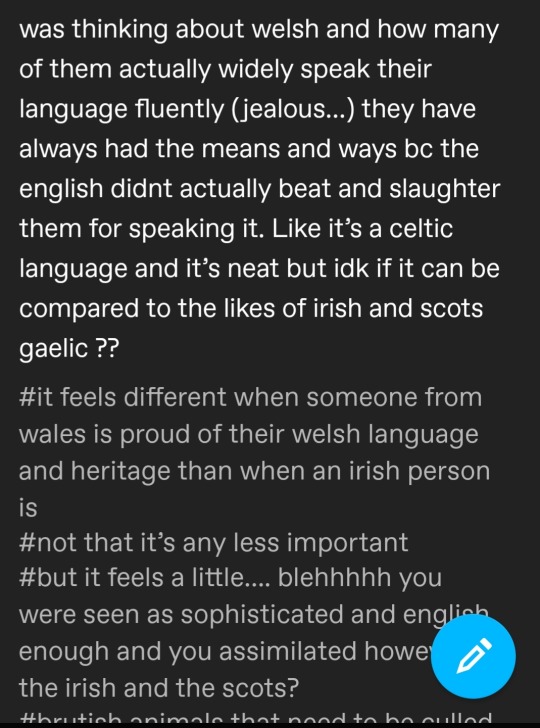
I'd like to preface this with that this is a screenshot of a post I saw a few days ago in the #welsh tag and that the OP has since deleted this post, but the sentiment is something I'd like to address since I see a lot of parallels with this kind of thinking in other contexts, such as in LGBTQIA+ rights conversations.
So, the most obvious elephant in the room is the idea that Welsh is super widely spoken in Wales now and that it isn't in as much danger as other Celtic languages. This idea is wishful thinking at best and erases the very real danger that Welsh is in and that it could be lost just as easily as Irish or Scottish Gaelic. Cornish (which is related to Welsh) actually did die out and has had to be revived. To make a metaphor out of this, we classify languages on a scale of non-threatened to endangered in a similar way to how we classify species.
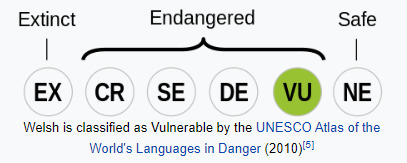
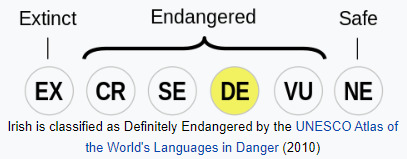
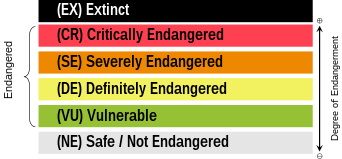
Here are the statuses of Welsh and Irish as of 2010 (above) and the statuses of Lions and Tigers (below).

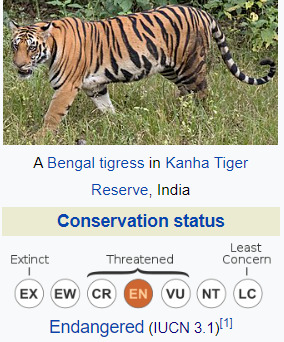
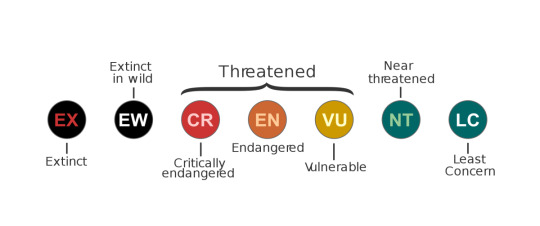
On paper tigers are more 'in danger' than lions. But that does not mean that lions are suddenly not in danger at all. The little bracket above CR, EN and VU labels all of these classifications as threatened. It isn't (and definitely shouldn't) be a competition of 'who is most in danger' because you do not want the thing you care about (whether it be a species or a language) to be in danger.

To come back to the original screenshot "they* [Welsh speakers] have always had the means and the ways because the English didn't beat or slaughter them for speaking it"- on the most basic of levels, this is just incorrect. The Welsh Not was a wooden token hung around schoolchildren's necks if they spoke Welsh in school. If someone else spoke Welsh the Not would be hung around their neck. At the end of the school day, whoever was wearing the Not would be beaten and caned by their teachers. I needn't go into much detail but there have been concerted efforts to beat Welsh out of schoolchildren. With the lions vs tigers metaphor, making the claim Welsh speakers have never been beaten for speaking Welsh because they always had the means and ways, while Irish speakers were beaten and never had the means or ways is like claiming poachers have never shot lions, only tigers. Bottom line is, lions and tigers are both victim to poaching and both species have suffered as a result. Similarly, Welsh and Irish have both suffered language loss and both need conservation efforts in order to survive.
(*sidenote- the consistent use of 'them' and 'they' in the original post is definitely indicative of a 'us vs them' sentiment which is a deeply unhelpful attitude to have when it comes to endangered languages and the Celtic languages in particular)
I see parallels with LGBTQIA+ rights in this situation. When equal marriage came in for gay and lesbian couples in the UK in 2014, many allies began to act like gay rights had now been achieved and that gay issues had been done, they're solved. Except, they really weren't (and aren't). Progress has been made in Wales and undeniably Welsh is doing the best out of the living Celtic languages. But that doesn't mean Welsh has been saved or that full equality for Welsh speakers has been achieved. It very much hasn't. The sentiment of the post in the screenshot is not conducive to helping Irish or Scottish Gaelic. Putting down Welsh speakers and erasing Welsh-language history will not save Irish or Scottish Gaelic. Pretending Welsh has had it easy in some kind of lap of luxury is a deeply harmful and bogus claim.
I'll address the tags under the cut as this post is getting long.
To address the tags, personal feelings ≠ an accurate reading of a situation. Nor is it praxis, for that matter. Why is pride in Welsh different/less good than pride in Irish? Is it the assumed proximity to England? If so, that's a terrible claim to make. Not only that, but Scotland is also next to England- does that make pride in Scottish Gaelic the same as pride in Welsh according to this metric? It's a ludicrous thing to say and deeply insensitive to the needs of Scottish Gaelic and Welsh speakers, who cannot help any current or former proximity to England.
Additionally, proximity to England ≠ worse. I know it's a popular internet joke to hate on England because of English attempts to eradicate the Celtic languages, but when the joke becomes praxis, it does not help. England ≠ a place devoid of Celtic languages either. Many English counties near the Welsh border actually have communities of Welsh speakers, such as Oswestry (Croesoswallt) in Shropshire. Cornwall is also home to many speakers of revived Cornish. It does a disservice to Celtic speakers in England to insinuate that proximity to England taints or corrupts them somehow. This is how ethnonationalism starts and we ain't about that.
And "#it feels a little.... blehhhhh you were seen as sophisticated and english enough and you assimilated however the Irish and the Scots? #brutish animals that need to be culled". So, this is arguably one of the worst things to say about a Celtic language- or any threatened language in general. First of all, the 'you were seen as' - 'you' is very telling. The switch from 'them', 'they' to 'you' indicates that this sentiment is aimed at Welsh speakers directly. This was likely a subconscious thing that OP wasn't thinking about when they wrote this. But it does indicate unhealthy feelings of jealousy and bitterness unfairly directed at Welsh speakers, who are also struggling. This righteous anger at the decline of Irish and Scottish Gaelic would be better directed at efforts to help promote those languages- some useful things to get involved with are LearnGaelic, similar to DysguCymraeg but for Scottish Gaelic or supporting channels such as Irish channel TG4 by watching their programmes.
The idea that Welsh speakers were or are 'sophisticated and english enough' is insulting and carries with it a lot of baggage of how any of these assumptions came about. Welsh speakers were definitely not seen as sophisticated. Where Welsh was 'tolerated', it was treated as a curiosity, a relic of a bygone age. Classic museification which all Celtic languages and cultures suffer from as well. Welsh was not tolerated in any legal sense since 1535- with English becoming the only valid administrative language and the language of Welsh courts after England annexed Wales into its Kingdom. Monolingual Welsh speakers suddenly had no access to any legal representation, unless they learned English. This is no voluntary assimilation- it is an act of survival for many speakers of minoritised languages to 'assimilate' into the dominant culture, or else risk losing access to legal security and other kinds of infrastructure. You need only ask any non-native English speaker living in an Anglophone country what that process is like. Welsh people did not see English incursion as an opportunity to become 'sophisticated and english enough', they had to assimilate in order to survive.
The "Irish and the Scots? #brutish animals that need to be culled" is also painfully misrepresenting a very complex social and political process that unfolded over the span of hundreds of years. The phrasing itself of 'brutish animals that need to be culled' speaks to righteous anger at the damage done to these languages and cultures, but it reinforces negative stereotypes about the Irish and Scots themselves. It also is more complicated than a simple English hatred of anything non-Anglo, since the English conception of particularly the Irish changed a lot over the centuries. It was (and still is) rarely consistent with itself. See: the enemy is both strong and weak. The very earliest Celticists were by and large, Anglos or French.
Ernest Renan (1823-1892) for example, was an early French Celticist who published La Poésie des races celtiques (Poetry of the Celtic Races- English translation) in which he says:
"... we must search for the explanation of the chief features of the Celtic character. It has all the failings, and all the good qualities, of the solitary man; at once proud and timid, strong in feeling and feeble in action, at home free and unreserved, to the outside world awkward and embarrassed. It distrusts the foreigner, because it sees in him a being more refined than itself, who abuses its simplicity. Indifferent to the admiration of others, it asks only one thing, that it should be left to itself. It is before all else a domestic race, fitted for family life and fireside joys. In no other race has the bond of blood been stronger, or has it created more duties, or attached man to his fellow with so much breadth and depth"
Yeah. This guy (unsurprisingly) was a white supremacist. Note that this sentiment is being applied to all people considered Celtic by Renan- Irish, Welsh, Breton, Scottish, Cornish, Manx etc. None unscathed by the celtophobia of the day. In this period, Celticity was romanticised (yet disparaged at the same time). It is less 'brutish animals' and more 'archaic, time-frozen peoples' in this period. Of course, 'brutish animals' attitudes towards Celticity did still exist, but it is disingenuous to act as if it was this attitude alone which drove English celtophobia. Like many things, it is always more complicated and never clear cut as it might seem.
I'll bring this to a close shortly, but returning to OP's suggestion that the Welsh assimilated and the Scots and Irish did not, is also incorrect in that some Scots did have to assimilate to survive as well. The Statutes of Iona (1609) required Scottish Gaelic speaking Highland chiefs to send their sons away to be educated in Scots and/or English in Protestant schools. Many did as the statutes required, which led to further language loss in the Highlands of Scottish Gaelic. These are acts of survival- and not ones always taken willingly.
This has been a long post but it's one which I felt I wanted to address. There's no need for infighting between speakers of Celtic languages over who has it worse. There isn't any answer to that question, nor is it a good use of time or energy. All in all, the Celtic languages have suffered greatly over the years and its only just now that some of them are turning a corner. If you care about these languages, put your energy into something good. Only through active work will these languages be saved for generations to come.
#long post#lukes originals#cymraeg#gaelige#gaidhlig#Irish#Welsh#Scottish Gaelic#politik#not dictionary related#Celticist#Celtic Studies#This took a lot of energy to write so if you found this post useful please consider reblogging
1K notes
·
View notes
Text
Irish, Welsh and Scottish Gaelic speakers, I need your help! 🇮🇪🏴🏴
For a piece of academic writing I am working on right now, I was wondering if in the context of those three languages, you have positive or negative examples of:
1) The presence of non-standard dialects digitally or in the media (any content creator you know, any regular speakers on the radio that actively uses a non-standard dialect, or on the contrary, you only encounter standard Irish/Welsh/Gaelic. If you have any example of non-standard writing too, for example in the printed press, I am all ears)
2) Do you speak and/or write a non-standard dialect and have been looked down upon for it by other speakers? If yes what dialect and in what context
3) What do you think about purification practices in which loan-words from English are replaced by new words? Which words do you use? If you study the language formally, which are taught to you?
Thank you, and please reblog!
- A grateful Celtic student
#Irish#Gaelic#Scottish Gaelic#Welsh#gaeilge#cymraeg#Gàidhlig#Ireland#Scotland#Wales#Celtic languages#Minroty languages#Linguistics#Standardisation#Celtic#Celtic studies#Languages#Alba#Mostly for native speakers but also non-native fluent speakers that regularly interact with the language
87 notes
·
View notes
Text

I survived my first Tionól! (An intimidatingly erudite Celtic Studies conference at DIAS.)
I would like to know who told Ruairí Ó hUiginn about my novels, because I did not mention that in my bio, but he did when introducing me 😆 Has he been googling me or is Kevin Murray taking the proud academia dad act to new extremes? We will never know, I guess...
29 notes
·
View notes
Text
Not the University of Toronto rebranding their Celtic Studies program to "Irish and British Studies"

63 notes
·
View notes
Note
Bore da, coming in with a request: due to announced budget cuts in higher education in the Netherlands and financial pressure in the Humanities department, Utrecht University plans to cut the BA Celtic Languages and Cultures (amongst German, French, Arabic and Islam, Italian, and Theology). This is the only BA in the Benelux that offers education and expertise in this field of studies, and cutting it would be a huge loss, if not for the expertise, then for the diversity of the academic field in the Netherlands. You can sign this petition to help save Celtic Studies specifically 🟥 we know this has worked in the past, so please consider signing/getting the word out! 💛
As for the other studies, the budget cuts do tend to hit the humanities departments, especially the (smaller) language and culture studies; Leiden University has announced a fusion for their Chinese, Japanese, and Korean BA's, and Arabic's in cold weather there too. There's a petition to sign to show support for these fields of study and general support for higher education!
Thank you so much for sharing 💚 I don't think I would've recognised and enjoyed such a wide amount of themes and beats in Camlann if it wasn't for my studies. Diolch yn fawr iawn!💚✨
Hey there! Folks reaing this, please do sign the petition and spread the word. Hopefully we can change their minds!
8 notes
·
View notes
Text
A History of Gaelic Script, A.D. 1000-1200?
Does anyone happen to know where I could access a copy of Dr. Elizabeth Duncan's PhD thesis "A History of Gaelic Script, A.D. 1000-1200" online somewhere? I would write to her, but she seems not to have an online presence anywhere.
#gaelic#irish#irish mythology#gaelpol#paleography#manuscript studies#gaelic paganism#gaelic polytheism#gaelic literature#celtic#celtic studies
11 notes
·
View notes
Text
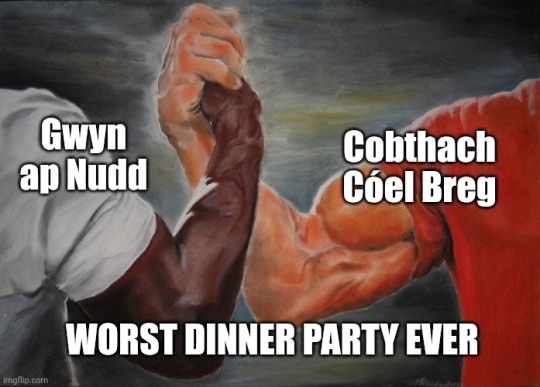
#gwyn ap nudd#medieval literature#medieval welsh#medieval irish#welsh mythology#celtic studies#something something a hearty meal#i can't believe i'm awake thinking of heart puns when aorta be sleeping 🥁#thank you i'll be here all week#(good night for real though and sorry for spamming you all tonight 😘)
11 notes
·
View notes
Text
Very Urgent Poll about Deep Celtic Studies Questions:
3 notes
·
View notes
Text
Author: Kevin Mills
Description from Bloomsbury:
An introduction to ancient myths and the critical discussions that surround them, this book dives into the stories of pre-modern culture, taking a comparative look at how they have shaped the West and modern storytelling as we have come to understand it today.
It makes texts and scholarship from near Eastern, Classical and Celtic disciplines engaging and accessible, and traces narrative meaning through stories from ancient Mesopotamia to the BritishMedieval Period, offering compelling pathways into such writings as The Epic of Gilgamesh, Genesis and Job, The Odyssey, The Mabinogi, TheLife of St Cadoc and Sir Orfeo. Looking at each in detail, Myths and Ancient Stories also explores myth through a modern lens, probing at how, in this scientific age, it continues to inspire contemporary film, games and literary works such as those by, Margaret Atwood, Colm Tóibín, Madeleine Miller and Pat Barker.
Impressive in breadth and bringing together a wide range of foundational texts from diverse traditions for the first time, this work is the ideal orientation to the ancient works central to English literary culture, shedding light on the mythological roots of storytelling and narrative.
#to read list#book#ancient myth#mythology#Kevin Mills#Bloomsbury#Myths and Ancient Stories#Narrative#Meaning and Influence in the West#pre-modern culture#storytelling#literary studies#near eastern studies#classical studies#celtic studies#narrative#literary culture#The Epic of Gilgamesh#Book of Genesis#Book of Job#The Odyssey#The Life of St Cadoc#The Life of St Orfeo#The Mabinogi#arts and humanities#arts and culture#stories#history
5 notes
·
View notes
Text
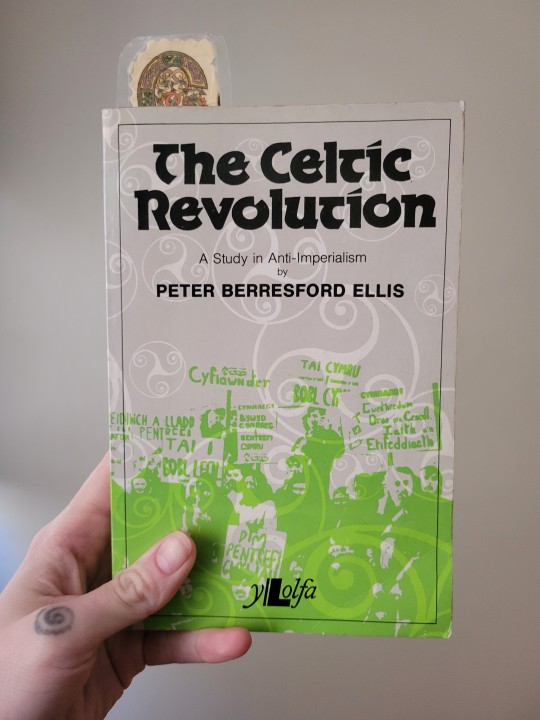
just finished this a few days ago and it's my new favorite I think
there's a chapter dedicated to each of the 6 'celtic nations', which the author defines as any nation whose native language is a celtic one (Éire, Alba, Cymru, Kernow, Mannin, and Breizh), and their individual struggles against colonialism and a brief history of their native languages and efforts made to revive them. then follows chapters on the diasporas of these countries, unity between the celtic nations, and a brief look at nationalism/nationalist movements from each.
in the introduction, the author makes this statement which is reiterated and proven in the rest of the book: "I write as someone who fully supports Celtic cultural, political and economic independence. Nor do I disguise the fact that I am a socialist", saying that writing unbiased historical works is a myth and authors should be up front about their biases from the start.
22 notes
·
View notes
Text
My boss: Hey I don’t want to pry or anything, but I’m curious- why did you go into Celtic Studies, of all things?
Me: I like bog bodies a normal amount, yes
My boss: What on earth is a bog body?
Me, vibrating: do you want the speech, the PowerPoint, or the formal essay,
#bog body#bogs#bodies#BOG BODY BOG BODY BOG BODY#text post#Celtic studies#celtic#ireland#I have handmade visuals too#people sometimes make the mistake of letting me speak
11 notes
·
View notes
Text
Xenophobia in Celtic nations' independence movements: A guide to the red flags
This is something I've wanted to write about for a long time - I want to go over this in more detail when I can. But for now a short guide to the most egregious red flags is warranted imo.
'Celtic nations' refers to the modern regions where Celtic languages are still spoken, namely Ireland, Wales, Scotland, Isle of Man, Cornwall and Brittany. Its important to know that these places are called Celtic not because of who lives there, but because of the languages which have survived there. Its a common error to think 'Celtic nations'= Celtic people. In my field (Celtic Studies) Celtic is generally only applied as a descriptor in the sense of language family.
Because of the popular misinformation 'Celtic nation' = 'Celtic' population, xenophobia rears its ugly head in multiple corners of the various Celtic nations' independence movements. Left unchecked, this xenophobia develops into outright racism. Which is why it's important to recognise these red flags when you see them.
'Acceptable Targets':
The reason why some of the xenophobia goes unchecked (and develops into worse kinds) is because a lot of xenophobia in the Celtic nations is aimed at 'acceptable' targets - which no-one bats an eye about when this rhetoric is deployed. But were it deployed against any other nationalities, it would immediately obvious that it isn't acceptable. Now, I will preface this with that there's nuance with these nationalities and there's something to be said about whether some of it is 'punching up'. However, because of how accepted it is to be casually xenophobic against these privileged groups, it is signalled through that that it's okay to be xenophobic in general to less privileged groups. I feel its important to address the first rung on the ladder before tackling any higher up.
Without beating around the bush, I'm talking about the English (and French. But I know more about the English so that's where my focus will be).
Yes, pro-independence anti-English memes and jokes can be funny. Most of them do stay on the side of punching up and many raise important points on the effects of English imperialism on the Celtic languages. However, there's a fine line between punching up and voluntarily using and wielding xenophobic arguments and rhetoric to get one up on the English. This, in my view, only paves the way for worse kinds of xenophobia and to me is a canary in the coal mine situation. But I also cannot talk about this without also making it clear that it is possible to recognise that sometimes a line is crossed without validating English persecution complexes à la 'you can't even say you're English these days' or similar nonsense. Both things can be true at once: Casual xenophobia against the English does exist, however, its existence should not be used to validate English persecution complexes. On the contrary, we should fight that also.
The reason why this canary in the coal mine has gone unnoticed is because of the reluctance to actually point out xenophobia against the English in pro-independence movements due to fear of accidentally validating the claims Englishness as a concept is under threat or due of fear of ostracism from Celtic nationalist movements. There is little danger of actually validating the former sentiment, however, because of a crucial fact. The people in the Celtic nations being casually xenophobic and the English with persecution complexes have one massive trait in common: they're both xenophobic in incredibly similar ways. If it's hard to tell apart an English nationalist from one in a Celtic nation if you were to swap the target of their ire, congratulations, your movement has a xenophobia problem /s.
English nationalist: We should tighten controls on our borders to keep all those foreigners and immigrants out. Make England English again.
(Xenophobic) Celtic nationalist: We should fight for our independence so we can tighten controls on our borders to keep all those foreigners and immigrants out. Make [insert Celtic nation] [nationish] again.
Many Celtic nationalists will also present ahistorical facts or manipulated versions of history in order to seem more valid or legitimate. It's a massive red flag when someone's grasp of history seems more emotional than grounded in historical fact. Using Welsh history as an example, I've seen this type of Celtic nationalist blatantly lie about historical figures, literally deface ancient castles in Wales based on a poor grasp (and respect for) history and conflate modern English and Welsh identity with ancient entities which do not map neatly 1:1. The ahistory presented by individuals or groups fancying themselves as leaders in their respective movements are unquestioningly accepted by others in the Celtic nationalist movements. This creates a manufactured mythology, belief in which confers in-group status and out-group status. A mythology which reinforces beliefs already present in the movement - such as the right to be casually xenophobic as long as it's against the 'right people' and as long as it is done in the name of protecting or advocating for their nation.
It was never going to stop at English people:
Once casual xenophobia is established as being tolerated, expected or even encouraged in the various independence movements, it enables xenophobes to be bolder in their rhetoric. Because casual xenophobia against 'deserving' nations like England is dismissed as 'just banter' and not taken seriously, it sends a signal to everyone in that movement that xenophobia is okay if its used against the 'right groups. While it may roll like water off a duck's back to the average English person, other, more vulnerable people do not fare so well.
To use an actual example I've seen out in the wild, some people will claim that you can't be considered Welsh unless you were born in Wales. Many people won't question this or interrogate the implications. Firstly, this comes back to how Celtic nationalists can often sound exactly the same as English nationalists (blood and soil nationalism is common to English and Celtic nationalisms). Secondly, this rhetoric also simulataneously invalidates several ostensibly Welsh people, such as Saunders Lewis (born in Liverpool) and Jan Morris (born in Somerset). In most cases, anyone who lives in X country / is a citizen of X country can or should be able to describe themselves as Xish.
The perennial anxiety of Celtic nationalists is that because most of the Celtic nations (excepting the Republic of Ireland) are constituent parts of a state (either the UK or France) and not independent entities in their own right, there is no control over borders and there is no system by which someone can be made a Welsh, or Breton or Cornish etc. citizen - and thus no way to control [nation]ness via those means. When Celtic nationalists agitate for independence, it's important to interrogate their motivations. If they are motivated primarily by a desire to control who is considered Xish and who isn't, that's a red flag.
English nationalists have this citizenship problem too, since England is not an independent nation, but a country within the UK. However, most English nationalists overlap heavily with British nationalists in general, so most agitation for 'sovereignty' gets channelled into British nationalism. This is one of the key differences between English and Celtic nationalists - the former is usually very fond of the United Kingdom, the latter detests it and wants to secede. This leaves Celtic nationalism in a tight spot - there is a desire for self determination which is currently impossible to achieve or enforce. And that makes a lot of Celtic nationalists anxious. And that anxiety leads to feeling like they need to prove their commitment to the cause by performing xenophobia, which validates their in-group status while simultaneously establishes the out-group.
A person born in England but who lives in Wales, perhaps speaks Welsh or considers themself Welsh will, in general, be mostly unharmed by 'you have to be born in Wales to be Welsh' rhetoric. But you know who might be? So many immigrants who consider themselves Welsh who make Wales a great place to be. Immigrants in Wales (especially nonwhite immigrants) may feel excluded by such rhetoric. It's almost on par with "where are you really from" sentiments. And this is an entirely self-defeating kind of rhetoric for Celtic nationalists to take up. Here we have thousands upon thousands of people who willingly want to live and work in Celtic nations - many of whom will also learn the language - undoing centuries of English and French propaganda that diminished the worth of Celtic nations and their languages* - and Celtic nationalists want to exclude these people from claiming the nationality of their adopted nations because... they didn't happen to be born here. Got it.
Xenophobia, once established, cannot be contained:
Xenophobia ripples outwards. Once it is established it is okay to be xenophobic to certain groups, other groups begin to be included in the xenophobia. This then has the potential to expand into outright racism. In Ireland, for example, there's significant amounts of antiblack racism present in the nationalist movement. Very recently, due to the actions of the UK government over the Rwanda Plan, the Republic of Ireland has gotten frustrated at the amount of immigrants attempting to reach their shores after abandoning attempts to claim asylum in the UK (out of fear of being sent to Rwanda). There's a "we don't do that here" attitude in many Celtic nationalist movements with regards to English imperialism, xenophobia, racism and anti-immigration. But not only do we do that here - it's worryingly integral to some people's visions for their nation's independence! You end up with complacency because many will take a literal no true Scotsman approach to Celtic nationalism and pretend that such people aren't really part of the movement. The problem is, is that they are here and regularly hijack otherwise unproblematic movements.
There are many routes through which Celtic nationalists can get radicalised into becoming massively xenophobic in order to fight for their respective nation's independence. All of them stem from real, legitimate problems in each nation whose cause has been misidentified.
One way is through opposition to second homes. On all counts, a noble goal and a very legitimate problem which I myself am invested in fighting. But the ways in which this problem is addressed often veer into questionable territory. If the focus is on "how dare those people from over there come over here" instead of "how dare a very small group of people monopolise housing for holiday lets at the expense of locals" there's a problem. The problem isn't people not from [place] holidaying there, it's the people who monopolise housing for their own profit which reduces housing available for locals and destroys community. In Aberystwyth I've heard some appalling sentiments against people from the Midlands - borderline if not outright classism around their appearances, mannerisms and accents. Sneering at random families visiting the beach isn't going to help anything and only exposes thinly veiled bigotry in whoever is making such remarks.
As already mentioned, another way radicalisation into xenophobic Celtic nationalism can occur is through mythologised 'history' which has been manipulated to suit the needs of the person or people making the claim. Lately, I've been seeing a rise in Welsh 'history' groups rife with disinformation and outright misrepresentation of historical events which are so designed to keep people angry about historical injustices against Wales. There are plenty of real historical injustices which can be talked about - but the 'history' presented in these groups is often fabricated or twisted to make things worse than they were or are stripped of nuance which perhaps paints certain historical figures less favourably than the authors would have liked. Not to mention superimposing modern nationalism onto ancient peoples is also just accepted as fine to do. Here is a screenshot of a Welsh 'history' group shared in a Welsh learning group I'm in. I can and will do a deeper dive into this topic in particular when I can. For now I'll mention the most important things to notice:
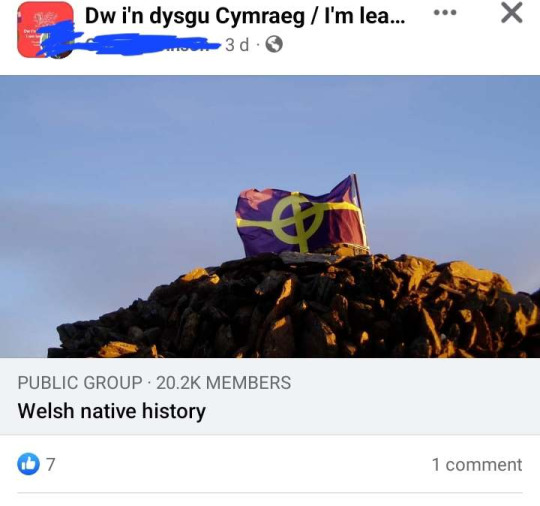
As mentioned in one of my other posts on this topic - the term 'native' is frequently misused in a Celtic context. Here, it sets up the basic in-group/out-group dynamic from the start and creates a setting in which members of the group are privy to the 'real' history while others are not. A brief glance at posts in this group makes that quite clear. The flag in the image is a representation of Y Groes Naid - supposedly a piece of the True Cross kept at Aberconwy. Now, there are ways to depict this cross which aren't so dogwhistley - so I'm immediately suspicious this image was chosen on purpose. Right down to the fact there's plausible deniability if anyone tries to point out how much the flag looks like the white supremacist Celtic Cross symbol, since it's Y Groes Naid, right?
I will wrap this up with that as a Celticist, I see far too many people uncritically supporting certain Celtic nationalist movements simply because they are pro-independence. Turning a blind eye to 'acceptable' xenophobia and choosing to believe ahistorical versions of history because it better suits their politics. This must be resisted - we can advocate for the independence of Celtic nations which desire it without relying upon these means. It can be done, I promise. But the path to that means dismantling systems of oppression which exist within Celtic nationalist movements. Awareness of the problem in the first place is a good place to start.
Reblogs and comments are welcome on this post to raise awareness of the issue and actually talk about these things.
Diolch am darllen!
#cymblr#tymblr#Celtic#celtic studies#celtic languages#celtic nations#racism cw#(in case)#xenophobia#anti xenophobia#antiracism#celtic history#celtic mythology#welsh nationalism#annibyniaeth#annibyniaeth wrthfasgaidd#antifascism#Ireland#Wales#Scotland#Isle of Man#Cornwall#Brittany#I didn't have time to touch on pan-celtic nationalism but that's a whole nother beast#reblogs welcome#long post
148 notes
·
View notes
Text
More than 4 years ago I was lying on my bed in Northern France listening to Mairead Nan Cuiread by Tannas. I was thinking how beautiful that song was, how intrinsically musical and rhythmic the language sounded, how enchanting it would be to learn more about the Gaels. I wrote my application to the University of Edinburgh listening to it. Today in my last year of uni my Celtic teacher contacted us to ask us to go over Mairead Nan Cuiread as it is the waulking song we will be studying tomorrow. We have gone full circle. I couldn't be more grateful
24 notes
·
View notes
Text
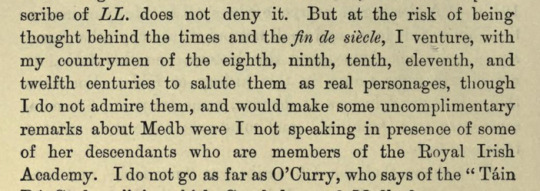
"yeah Medb was real, but also she sucked. not gonna say that out loud in case I get blacklisted from Celtic Studies though" -- Edmund Hogan in 1892, apparently??
70 notes
·
View notes
Text
I would also like the add (not AS myth focused but culture focused)
-Caitlín Matthews, Celtic Visions: Omens, Dreams and Spririts of the Otherworld
-Nerys Patterson, Cattle Lords and Clansmen: The Social Structure of Early Ireland
-Bart Jaski, Early Irish Kingship and Secession
-anything Fergus Kelly (for Law Tracts and culture)
-anything Damian McManus (for linguistics)
- J.P. Mallory, The Origins of the Irish
-Berry Cunliffe, The Ancient Celts
- Sharon Paice MacLeod, Celtic Cosmology and the Otherworld: Mythic Orgins, Sovereignty and Liminality
So, You Wanna Study Irish Mythology?
One of the questions I get hit with a lot is “If I’m getting into Irish Mythology, what sources do you recommend?” It’s a sad, sad truth about the field that a lot of really valuable info is kept locked away in books and journals that the lay person wouldn’t know about (and then we wonder why information about the field is so bad.) So, I decided to compile a list of sources that I’ve personally used and found helpful in my time. It’s not a complete bibliography because, frankly, that would take up a TREMENDOUS amount of space and you’d be scrolling forever to find what you wanted, and I don’t AGREE with every single thing they say, and it’s by no means exhaustive (keep in mind: scholars from all over the field use mythological texts to study things as diverse as law, geography, tribal names, material culture, etc. and here I’m mainly focusing on sources that are JUST mythological-focused) but they’re a good starting point to forming your own opinions. The journal articles are, tragically, generally kept confined to academia, but….perhaps….if you were to ask around, someone might be able to provide you with a copy. As a whole, Celticists tend to be quite generous when it comes to sharing articles.
List subject to change, check back as time goes on to see if I’ve added anything. Also, as always, feel free to either drop me an ask or a pm if you’re curious about digging further into a given text/figure. I can’t act as a consultant on a religious question; I’m a very firm atheist with all the spirituality of a dull spoon, except with the existence of ghosts. My interest in the Tuatha Dé is purely scholarly; all that I can say is what I know about these topics from the perspective of the medieval sources, but I can definitely do my best on that one front, and I won’t reject anyone who has a different interest in the Tuatha Dé from contacting me.
This list only deals with the Mythological Cycle, not the other strands of the literary tradition that is generally if not uncontroversially referred to as “Irish Mythology”. For Fenian Cycle traditions, a similar bibliography has been compiled by Dr. Natasha Sumner of Harvard, here.
Editions/Translations of Texts (many of these are available at UCC’s CELT archive or on Irish Sagas Online):
Tochmarc Étaíne, Osborn Bergin and Richard Best
Cath Maige Tuired, Elizabeth Gray (If you can and you’re serious about the field, I highly recommend getting the actual Irish Text Society Edition, which includes a wonderful index of every time a given figure shows up in other sources. An absolute must for a mythographer.)
Lebor Gabála Érenn, J.R.S Macalister, 5 vols. (The entirety of this is available on archive.org. Personally…while the rest of it is obviously important and worthy of study, if you’re interested in just the mythological stuff, I recommend Volume IV, which includes both the Fir Bolg and the Tuatha Dé. Unless you really, really want to read five volumes of medieval Irish pseudohistory, the last volume of which was finished posthumously.) i ii iii iv v
The Metrical Dinshenchas, Edward Gwynn. (5 vols.) (These are difficult, with many scholars outright ignoring them except when absolutely necessary. These are in a later form of Irish, which means that, while some of the contents in them could very well be Pre-Christian in nature, they very much do reflect a later medieval world. Some of them are just as much about contemporary politics as they are about mythology, and many of them also bring in content from the Ulster Cycle and the Fenian Cycle. My personal favorites to look up are Tailtiu, Carn Hui Néit, Duirgen, and Carmun, though there are MANY others.) i ii iii iv v
“The First Battle of Moytura”, John Fraser (Note: It’s a VERY late text, with the question of the Fir Bolg/Tuatha Dé battle and how far the tradition really goes back being one that’s very important to keep in mind. It’s a personal favorite of mine. But it’s very late.)
Baile in Scáil, Kevin Murray (Thurneyson also did an older edition that’s more readily accessible, hence why I linked it here, but Murray is the most recent and up to date.)
“How the Dagda got his magic staff”, Osborn Bergin
Oidheadh Chloinne Tuireann, Richard Duffy (This is an Early Modern Irish text, so it was written down comparatively late. That doesn’t mean that there’s NO mythological content here, it’s a personal favorite of mine, but it means that it very much reflects the cultural context of around….the 15th-17th century or thereabouts. It’s very chaotic, very violent, and the heroic figures are….not….heroic.)
Scél Tuáin Meic Chairill, John Carey
Echtra Nerai, it’s available in a fairly recent translation by John Carey in Celtic Heroic Age (pub. 2003) , listed below, though Kuno Meyer also did an edition/translation for it that I’ve linked to here.
Books:
Proinsias Mac Cana, Celtic Mythology (Personally, I’d recommend this one first - It’s designed for someone who isn’t a specialist and, while a lot of what he’s saying has been disputed back and forth, it’s still a handy primer and will get you into the myths.)
John Koch and John Carey, The Celtic Heroic Age (Once you have an idea of what you’re looking at, I recommend this one, since it’s a sourcebook. A TON of material from across the Celtic world, featuring classical sources, medieval Irish sources, and Welsh, all of it in one place.)
Mark Williams, Ireland’s Immortals (I personally recommend you read this one after you read CHA, giving you a bit of context for what Williams is saying here.)
O’Rahilly, Early Irish History and Mythology (note: A lot of what he says here is no longer considered recent in the field, but his knowledge of his own sources is, frankly, without any other peer. Use with a grain of salt)
John Carey, The Mythological Cycle of Medieval Irish Literature
Kim McCone, Pagan Past, Christian Present
Koch, Celtic Culture: A Historical Encyclopedia
Articles:
John Carey, “Myth and Mythography in ‘Cath Magh Tuired’”
John Carey, “Donn, Amairgen, Ith and the Prehistory of Irish Pseudohistory”
Proinsias Mac Cana, “Aspects of the theme of King and Goddess in Irish Literature”
Máire Herbert, “Goddess and king: the sacred marriage in early Ireland.”
Gregory Toner, “Macha and the invention of myth”
Elizabeth A. Gray, “Cath Maige Tuired: myth and structure“
Thomas Charles-Edwards, “Tochmarc Étaíne: a literal interpretation”
Tómas O’Cathasaigh, “Cath Maige Tuired as Exemplary Myth”
Joseph Nagy, “Close encounters of the traditional kind in medieval Irish literature”
Mark Scowcroft, “Leabhar Gabhála. Part I: the growth of the text”
Mark Scowcroft, “Leabhar Gabhála. Part II: the growth of the tradition”
Joseph Nagy, “‘Talking myth’ in medieval Irish literature.”
John Carey, “The Location of the Otherworld in Irish Tradition”
Máire Bhreathnach, “The sovereignty goddess as goddess of death?“
John Carey, “Notes on the Irish war-goddess.”
Veronica Philipps, “Exile and authority in Lebor gabála Érenn”
Kevin Murray, “Sources of Irish mythology. The significance of the dinnṡenchas”
#gaelpol#celtic studies#irish mythology#celtic mythology#the mythological cycle#gaelic polytheism#celtic reconstructionism#long post#books#resources and recommendations
3K notes
·
View notes